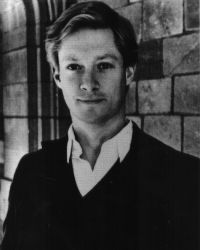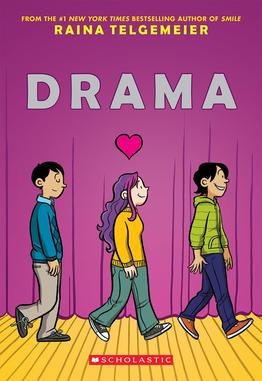Notes
- 1 2 M. Brettingham, "New storm brews over gay books", The Times Educational Supplement , p. 6, 2006-10-20
- 1 2 Kate Kellaway, "Moral Compass", The Observer , 9 Feb 2003
Hello, Sailor ( ISBN 0-333-99290-3) is a children's book by Ingrid Godon and André Sollie (illustrated by Godon). It was first published in the Netherlands in 2000, and in 2003 in the United Kingdom by Macmillan Books. It was one of the books cited in newspaper articles as being "forced upon schools" in the controversy in England in the implementation of the Equality Act in 2006. [1] The Christian Institute argues that this legislation effectively forces schools to include books with homosexual characters in school curricula, although government officials and gay rights advocates argue that no coercion exists. [1]
This children's book centres on a lighthouse keeper called Matt and his friend, Sailor, whom he deeply misses. Whilst Sailor is at sea, Matt plans to sail round the world with him if and when he finally returns, which Matt, convinced by his friends Felix and Rose, thinks is doubtful. However, Matt and Sailor eventually are reunited, and sail off together.
This book is perceived to be a thinly veiled story of male homosexuality. [2]
A review of Hello, Sailor featured in the British lesbian magazine Diva . The Independent described Hello, Sailor as "A charming and heartwarming tale", whilst The Observer remarked that it is "A beautiful book...it makes – just as it should – the love between two men as natural and deep as any other." [2]
The subject of homosexuality and Judaism dates back to the Torah. The book of Vayikra (Leviticus) is traditionally regarded as classifying sexual intercourse between males as a to'eivah that can be subject to capital punishment by the current Sanhedrin under halakha.

James Clayton Dobson Jr. (born April 21, 1936) is an American evangelical Christian author, psychologist, and founder of Focus on the Family (FotF), which he led from 1977 until 2010. In the 1980s, he was ranked as one of the most influential spokesmen for conservative social positions in American public life. Although never an ordained minister, he was called "the nation's most influential evangelical leader" by The New York Times while Slate portrayed him as a successor to evangelical leaders Jerry Falwell and Pat Robertson.
Queer studies, sexual diversity studies, or LGBTQ studies is the study of topics relating to sexual orientation and gender identity usually focusing on lesbian, gay, bisexual, transgender, gender dysphoric, asexual, aromantic, queer, questioning, and intersex people and cultures.

The American Family Association (AFA) is a conservative and Christian fundamentalist 501(c)(3) organization based in the United States. It opposes LGBT rights and expression, pornography, and abortion. It also takes a position on a variety of other public policy goals. It was founded in 1977 by Donald Wildmon as the National Federation for Decency and is headquartered in Tupelo, Mississippi.

Gay literature is a collective term for literature produced by or for the gay community which involves characters, plot lines, and/or themes portraying male homosexual behavior.

Scientology and its perspectives on sexual orientation are based on the writings of L. Ron Hubbard, the founder of the Church of Scientology. His statements about homosexuality have led critics to assert that Scientology promotes homophobia, though these allegations are disputed by some Scientologists.

King & King is a children's picture book co-authored and co-illustrated by Stern Nijland and Linda De Haan. King & King tells the story of a young prince whose mother is forcing him to find his princess. However, after meeting many princesses, the prince falls in love with another prince. King & King was originally written in Frisian and has since been published in ten languages. The book's illustrations have received both positive and negative reviews, as has the storyline. The book has been analyzed for both its usefulness in the classroom and its challenges to social norms.

And Tango Makes Three is a children's book written by Peter Parnell and Justin Richardson and illustrated by Henry Cole which was published in 2005. The book tells the story of two male penguins, Roy and Silo, who create a family together. With the help of the zookeeper, Mr. Gramsay, Roy and Silo are given an egg which they help hatch. The female chick, that completes their family, is consequently named "Tango" by the zookeepers. The book was based on the true story of Roy and Silo, two male chinstrap penguins who formed a pair bond in New York's Central Park Zoo.
Gay teen fiction is a subgenre that overlaps with LGBTQ+ literature and young adult literature. This article covers books about gay and bisexual teenage characters who are male.

Letter to a Christian Nation is a 2006 book by Sam Harris, written in response to feedback he received following the publication of his first book The End of Faith. The book is written in the form of an open letter to a Christian in the United States. Harris states that his aim is "to demolish the intellectual and moral pretensions of Christianity in its most committed forms." In October it entered the New York Times Best Seller list at number seven.

John Eastburn Boswell was an American historian and a full professor at Yale University. Many of Boswell's studies focused on the issue of religion and homosexuality, specifically Christianity and homosexuality. All of his work focused on the history of those at the margins of society.
John Frank Corvino is an American philosopher. He is a professor of philosophy and the dean of the Honors College at Wayne State University in Detroit, Michigan and the author of several books, with a focus on the morality of homosexuality. Corvino is sometimes referred to as "The Gay Moralist", a sobriquet he assumed while writing a column of the same name.

David M. Halperin is an American theorist in the fields of gender studies, queer theory, critical theory, material culture and visual culture. He is the cofounder of GLQ: A Journal of Lesbian and Gay Studies, and author of several books including Before Pastoral (1983) and One Hundred Years of Homosexuality (1990).
Jeffrey Burke Satinover is an American psychiatrist, psychoanalyst, and physicist. He is known for books on a number of controversial topics in physics and neuroscience, and on religion, but especially for his writing and public-policy efforts relating to homosexuality, same-sex marriage and the ex-gay movement.
There are many published theories about the politics of the Harry Potter novels by J. K. Rowling, which range from them containing criticism of racism to anti-government sentiment. The books have been argued to contain both liberal and conservative themes and viewpoints. According to Inside Higher Ed, doctoral theses have been devoted to the Harry Potter books. There are also several university courses centred on analysis of the Potter series, including an upper division political science course.

Section 28 or Clause 28 was a legislative designation for a series of laws across Britain that prohibited the "promotion of homosexuality" by local authorities. Introduced by Margaret Thatcher's Conservative government, it was in effect from 1988 to 2000 in Scotland and from 1988 to 2003 in England and Wales. It caused many organisations such as lesbian, gay, bisexual and transgender student support groups to close, limit their activities or self-censor.

Drama is a graphic novel written by American cartoonist Raina Telgemeier which centers on the story of Callie, a middle school student and theater-lover who works in her school's drama production crew. While navigating seventh grade, Callie deals with tween hardship, including confusing crushes, budding friendships, and middle school drama. It is a coming-of-age story that explores themes of friendship, teamwork, inclusion, and determination through Callie and her relationship with the people around her.
The Christian tradition has generally proscribed any and all noncoital genital activities, whether engaged in by couples or individuals, regardless of whether they were of the same or different sex. The position of the Roman Catholic Church with regards to homosexuality developed from the writings of Paul the Apostle and the teachings of the Church Fathers. These were in stark contrast to contemporary Greek and Roman attitudes towards same-sex relations which were more relaxed.
Ingrid Godon is a Flemish illustrator of children's literature.
André Sollie is a Belgian author and illustrator of children's literature.